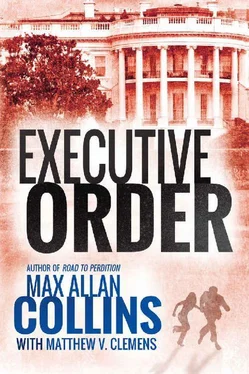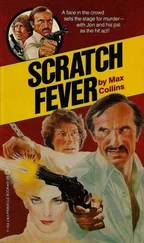Her man, who she didn’t recognize, was maybe thirty, dark hair, wedge-faced, blank-eyed.
The driver was older, forty anyway, with graying dark hair, pockmarked with a reptilian smile.
“Peep,” the driver said to Reeder, pleasantly but a little too loud.
“I can hear you,” Reeder said. “Make sure no one in the house can.”
“Kinda in over your head on this one, aren’t you, Peep?”
“Patti, this is Robert Clayton — Homeland.”
She nodded just a little. “Mr. Clayton.”
“You’re on the wrong side of this, Peep,” Clayton said. “But you can easily get on the right side. You could have Agents Nichols back, no problem, and we can negotiate our way out of this unfortunate situation that we find ourselves in.”
“Define ‘we.’”
His chin came up slightly. Pride? “You, and I, and some of the most patriotic Americans who’ve ever lived.”
“Well, some are going to die.” Slowly Reeder approached the man. “But you don’t have to be one of them, Bob, if you arrange to have Agent Nichols turned over to us without any further fuss.”
Clayton’s scowl was somehow reptilian as well. “Who do you think you’re talking to? You make a move on us, the two inside will execute the prisoner, and—”
Reeder hit Clayton with the baton, right along the side of his head. The Homeland agent chased himself to the cement, sprawled there out cold in a crisply pressed suit.
That’d got Rogers’ attention enough for her charge to risk a leap at her, right into a swing of the barrel of her pistol, which caught the agent much the way Reeder’s baton had his partner. He did a limp-puppet fall, clearly out before he landed.
Rogers said, “So, there’s two more inside.”
Reeder said softly, “Unless Clayton is cleverer than I give him credit for.” He nodded toward the nearest unconscious fed. “Use their own cuffs on ’em, bind their feet with their neckties, collect their pistols and cells.”
She nodded and did that while Reeder stood covering her by facing the door into the house, the nine mil in his right hand now, the baton tucked away.
Throughout, the only sounds were the rustle of clothing and light clink of the cuffs as she bound the unconscious men — nothing came from within the residence. Leaving the two men on the floor of the garage, one on either side of the Ford, they moved quietly inside — the connecting door unlocked — and found themselves in a mudroom, washer and dryer to their left, a bench and empty coat-hanger pegs to the right.
Gun in hand, Reeder walked them into a nice if characterless kitchen — stainless steel appliances, big island in the center, long counter — and she followed him. Dead soda cans were arranged on the counter like a little tin army — big-time agents tended to be tidy — and the smell of bacon lingered. No take-out bags visible in the wastebasket. Cooking for themselves.
A male voice echoed down a stairwell: “What’s with Clayton and Simpson? Should’ve been here ten minutes ago!”
From a nearby room, another male voice said, “Maybe he’s getting carryout for a change!”
“If so,” the stairwell voice said, “cheap-ass probably won’t bring us any!”
Downstairs said, “Why, you want to spend another half hour babysitting?”
“... Ten minutes, you call him.”
“Ten minutes, I call him.”
The kitchen took a left and emptied out into a dining area that opened onto a living room where a ginger-haired agent in his shirtsleeves lounged in a comfy chair with his feet on an ottoman. His back was mostly to them as he sat watching an old Bruce Willis movie on TCM, a can of Diet Coke on an end table between him and a couch.
Also on that table was a Glock.
Off to the left, just opposite the front door and entry area, an unenclosed stairway rose.
The openness of the room allowed Rogers to come around behind the agent and grab away the weapon before the guy knew up from down. He straightened, startled, looking toward where his gun had disappeared, and then on the other side of him another gun did appear, its snout touching his temple.
Reeder, whose weapon it was, whispered, “Clayton and Simpson are here. Tell him.”
The agent swallowed, nodded, and called, “Hey, they’re here!”
Which was true in a couple of ways.
“About damn time!” the stairwell voice said.
Rogers was already over at the bottom of the stairs, crouched down alongside where she couldn’t be seen. When the upstairs agent’s feet tromped down to meet the downstairs, she jack-in-the-boxed up and showed him the gun. Wearing a rumpled-looking, end-of-shift suit, he had a pale, doughy baby-face and tiny dark raisin eyes that opened comically wide. He had a gun, too, but Rogers yanked it from his waistband before his mind had started to work.
She used his cuffs to secure his hands behind him.
“Take a seat,” she said, and nodded toward the couch.
He went there and sat, his cuffed hands behind him clearly uncomfortable. On the TV, Bruce Willis was smirking.
Reeder was perched on the ottoman now with his nine mil trained on the ginger agent, who was sitting up, hands in the air.
Rogers came over and said to their hosts, “Just you two?”
Both captives nodded. Nothing forced about it. Still...
She found the upstairs empty until she got to the bedroom at the end of the hall, the door open.
In dark slacks and light blue blouse but no shoes, the tall, slender, model-lovely African American woman was on the bed, on top of the covers, pillows propped behind her. She had her hands cuffed in her lap and her ankles were bound with white cloth possibly torn from a sheet, which might have been the source for the white blindfold and gag, as well.
“Anne, Annie, it’s okay,” Rogers said, moving quickly across the room, holstering her weapon. “We’re here.”
Gently Rogers removed the blindfold, revealing a small gash in the center of a purplish lump near the woman’s left temple. This was the only overt sign of violence’s aftermath, and had probably occurred when Nichols was taken captive.
“You’re safe,” Rogers said, undoing the gag.
Her voice a hoarse whisper, Nichols said, “I screwed up, Patti. I really screwed up.”
“Course you didn’t. Let’s get you out of here.”
Rogers peeled off her suit jacket and snugged it around Nichols’ shoulders as the agent slipped off the bed and got unsteadily onto her feet.
Reeder appeared in the doorway.
“Our two friends are cuffed and quiet,” he said, jerking a thumb over his shoulder. “How is she?”
Rogers was drunk-walking Nichols across the room.
“Bad knock in the noggin. Annie, you need an ambulance?”
“No. No, no. Let’s just go.”
“Okay,” Reeder said. “I’ll check in with Miggie, though.”
He got Altuve right away and reported that they’d be back soon. “Tell Reggie to be ready with a first-aid kit. Have you heard from Ivanek?”
As he listened to Miggie’s response, Reeder looked up at Rogers and then shook his head.
No Ivanek yet.
Reeder asked the phone, “What about Bohannon?”
He listened and then his face went hard, then soft.
“Be back as soon as we can,” he said, then clicked off.
“What?” she asked, she and Nichols at the door now.
“Agent Jerry Bohannon,” Reeder said.
“What about him?”
“Dead.”
“The time is near at hand which must determine whether Americans are to be free men or slaves.”
George Washington, first President of the United States of America. Served 1789–1797. Commander in Chief of American Revolutionary forces.
Читать дальше












